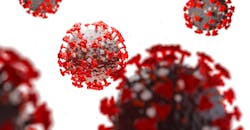The Centers for Disease Control and Prevention issued a new nonbinding recommendation for responding to the COVID-19 pandemic on Monday, Dec. 28. The guidance halves the recommended time in isolation or quarantine to five days from 10 for those who contract or are exposed to COVID-19 but don’t experience symptoms. Although the CDC’s recommendations are nonbinding, many businesses look to the government agency’s guidance for drafting policy.
The move could ease some short-term staffing shortages. New York state, last week, reduced the isolation/quarantine time for essential workers to five days, citing the need for health care professionals.
According to the CDC, the new recommendation is supported by results that suggest the majority of COVID-19 transmission happens “early in the course of illness,” typically in the first two days before symptoms occur and roughly three days after.
For those who test positive for COVID-19, the new guidance is the same no matter your vaccination status: Isolate yourself at home for five days, and if you don’t have any symptoms after that, leaving the house is fine provided you keep wearing a mask for five more days.
For those who are merely exposed to someone with COVID-19, though, CDC guidance differs depending on one’s vaccination status. Those who aren’t vaccinated, or who haven’t received a booster shot, should quarantine for five days and wear a mask for five more, like those who test positive. Staying home is not recommended, however, for those who are fully vaccinated and boosted or for those who have received Johnson & Johnson vaccines within the last two months.
In its guidance, the CDC noted that vaccination reduces the risk of “severe disease, hospitalization and death” from the pandemic virus, but that getting a booster shot reinforces existing protection.
Data from studies being done in South Africa and the U.K., the CDC says, now show that protection offered by mRNA vaccines developed by Moderna, Pfizer and BioNTech falls to 35% after enough time, but a booster dose raises the protection again to 75%.
CDC Director Dr. Rochelle Walensky, in a statement, said the updated guidance weighs both new information about the virus’ transmission and how vaccinations and booster shots protect against it. “These updates ensure people can safely continue their daily lives,” said Walensky.
Walensky also reiterated the CDC’s call to prevent the spread of the virus however possible. “Get vaccinated, get boosted, wear a mask in public indoor settings in areas of substantial and high community transmission, and take a test before you gather,” she said.
About the Author
IW Staff
Find contact information for the IndustryWeek staff: Contact IndustryWeek
